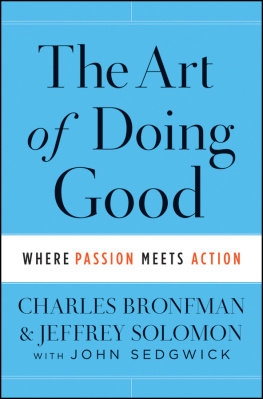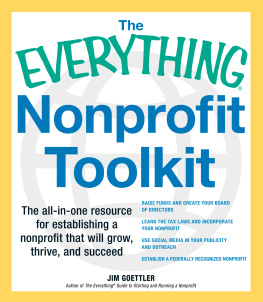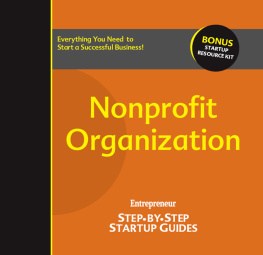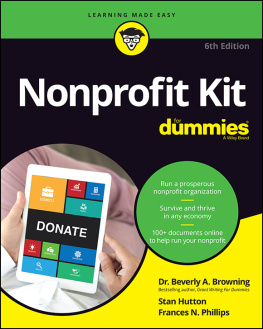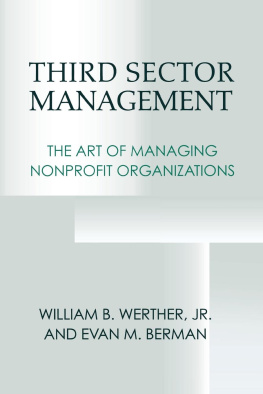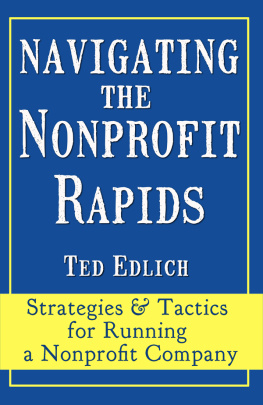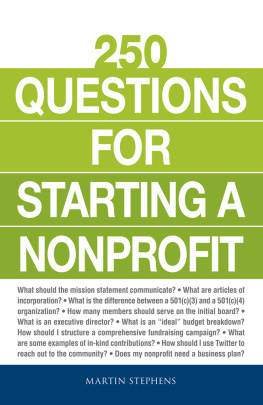More Praise for The Art of Doing Good
Charles Bronfman and Jeff Solomon have followed upon their first collaboration with another thoughtful articulation of the tried-and-true rules of successful social entrepreneurship. At once accessible and engaging, The Art of Doing Good is a font of well-reasoned counsel for aspiring nonprofiteers.
Adam Meyerson, president, Philanthropy Roundtable
I knew from the beginning that I was going to enjoy and gain great information from The Art of Doing Good, and I looked forward to the content as I read from page to page. In this book I found affirmation and confirmation of what it takes to bring good ideas to full potential and to realize full value and sustainability that benefits, respects, and improves the quality of life for whoever will be affected. This book is a treasure trove for all of us who are eager to give back in meaningful and sustainable ways. Both the ideas and the people who have created them add to the joy of doing good and are enriching my life. Thank you, Charles and Jeff!
Roselyne Chroman Swig, community activist
This work is lovingly dedicated to the memory of Andrea Morrison Bronfman who refused to accept the status quo in any philanthropic endeavor and urged all of us in that field to enhance the future through innovation and risk taking.
Copyright 2012 The Andrea and Charles Bronfman Philanthropies. All rights reserved.
Author photo: Bill Stanton
Jacket design: Adrian Morgan
Published by Jossey-Bass
A Wiley Imprint
One Montgomery Street, Suite 1200, San Francisco, CA 94104-4594www.josseybass.com
No part of this publication may be reproduced, stored in a retrieval system, or transmitted in any form or by any means, electronic, mechanical, photocopying, recording, scanning, or otherwise, except as permitted under Section 107 or 108 of the 1976 United States Copyright Act, without either the prior written permission of the publisher, or authorization through payment of the appropriate per-copy fee to the Copyright Clearance Center, Inc., 222 Rosewood Drive, Danvers, MA 01923, 978-750-8400, fax 978-646-8600, or on the Web at www.copyright.com. Requests to the publisher for permission should be addressed to the Permissions Department, John Wiley & Sons, Inc., 111 River Street, Hoboken, NJ 07030, 201-748-6011, fax 201-748-6008, or online at www.wiley.com/go/permissions.
Limit of Liability/Disclaimer of Warranty: While the publisher and author have used their best efforts in preparing this book, they make no representations or warranties with respect to the accuracy or completeness of the contents of this book and specifically disclaim any implied warranties of merchantability or fitness for a particular purpose. No warranty may be created or extended by sales representatives or written sales materials. The advice and strategies contained herein may not be suitable for your situation. You should consult with a professional where appropriate. Neither the publisher nor author shall be liable for any loss of profit or any other commercial damages, including but not limited to special, incidental, consequential, or other damages. Readers should be aware that Internet Web sites offered as citations and/or sources for further information may have changed or disappeared between the time this was written and when it is read.
Jossey-Bass books and products are available through most bookstores. To contact Jossey-Bass directly call our Customer Care Department within the U.S. at 800-956-7739, outside the U.S. at 317-572-3986, or fax 317-572-4002.
Wiley publishes in a variety of print and electronic formats and by print-on-demand. Some material included with standard print versions of this book may not be included in e-books or in print-on-demand. If this book refers to media such as a CD or DVD that is not included in the version you purchased, you may download this material at http://booksupport.wiley.com. For more information about Wiley products, visit www.wiley.com.
Library of Congress Cataloging-in-Publication Data
Bronfman, Charles, 1931- author.
The art of doing good : where passion meets action / Charles Bronfman and Jeffrey Solomon with John Sedgwick First edition.
pages cm
Includes index.
ISBN 978-1-118-26435-5 (hardback)
ISBN 978-1-118-28574-9 (ebk.)
ISBN 978-1-118-28246-5 (ebk.)
ISBN 978-1-118-28464-3 (ebk.)
1.Charities. 2.Nonprofit organizationsManagement. I. Solomon, Jeffrey, author. II. Title.
HV40.B866 2012
361.7630681dc23
Preface
WE HAVE TITLED THIS BOOK The Art of Doing Good. Now there's a concept. How exactly does one do good? It is much easier to imagine being good. But who is even to say what good is, let alone how to bring it about? After all, one person's good can be another person's badas evidenced by wars, political strife, and divorce. And, of course, doing good goes further, imposing one person's judgment about goodness on the world. That makes doing good suddenly seem ratherpresumptuous, for how can anyone be so sure of what good is?
The art of doing good is not in recognizing and attempting to fill an unmet need but in taking the large view by carefully considering all the consequences of the effort to do goodboth positive and negative.
In general, we consider it good to alleviate suffering and to promote satisfaction in this life. We put great stock in the psychologist Abraham Maslow's famous hierarchy of needs, which moves from food and shelter up to spiritual satisfaction. We believe it is always good to help people move up that hierarchy to ever greater fulfillment.
Still, it is probably because the good is complex, open to debate, and hard to certify when you get down to individual cases that those who try to do good are often derided as do-gooders. To us, there are few greater callings. In this book, we will use the term do-gooders occasionally to describe the social entrepreneurs we have selected to illustrate the themes of this book. We mean it as a compliment. For all our social leaders are bent on doing good in a mindful way. That is, they are aware of their own biases; conscious of the social, environmental, and financial implications of their efforts; respectful of cultural context; appropriately cautious about their abilities; and aware of the competition. But they also have a quality that is possibly more valuable than such an awareness, which is a willingness, if not an eagerness, to go for it and take a chance on change because they cannot bear to leave the world the way it is.
A word on terminology. We are inclined to refer to those featured in this book as social entrepreneurs, but we do so with a caution: strictly speaking, social entrepreneurs can be found on both sides of the for-profit and nonprofit divide, and are united in their belief in common entrepreneurial principles like finding new markets and applying strict measures of success. Social entrepreneurs are as likely to found a profit-minded philanthropy like Newman's Own as to start any of the ventures in this book. Nevertheless, because this book concentrates on nonprofitsbeing far more numerous and, we believe, far more potent entities for social changeour social entrepreneurs are drawn only from those ranks. We don't mean to suggest that there aren't other varieties of social entrepreneurs than the one we are describing here. It's just that there is no better word for the eighteen profiled in these pages. The terms philanthropist, volunteer, and

